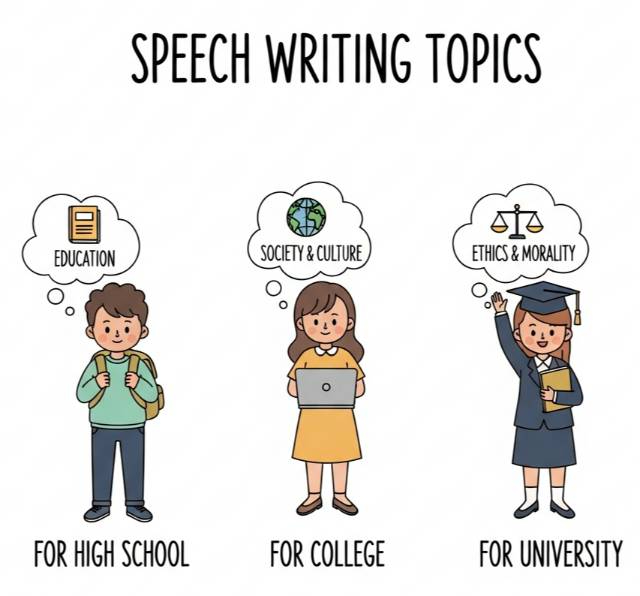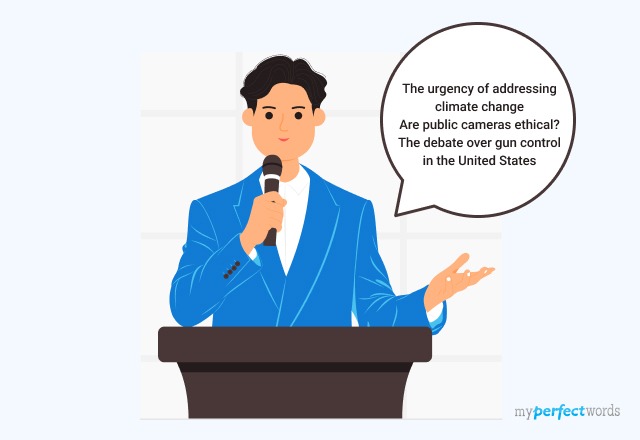What is Speech Writing?
A speech is a verbal presentation given to an audience as a means to express ideas, share information, or persuade others. A speech can serve various purposes such as informing, persuading, entertaining, or inspiring the listeners.
Speech writing is the process of creating a clear and organized script for a spoken presentation. This involves planning the content, choosing the right tone, and structuring the speech so the message is communicated clearly to the audience.
Speech writers carefully choose words, phrases, and rhetorical devices to maximize the impact of the spoken words. They aim to engage, inform, persuade, or inspire the listeners. Good speech writing is a skill that requires careful planning, research, and attention to detail.
Elements of Good Speech Writing
Writing a great speech is all about getting a few things right. Let's break down what makes a speech really work:
- Clear and to the Point: Make sure your message is crystal clear and focused. Know what you want to say and stick to it.
- Know Your Audience: Understand who you're talking to. What do they care about? What do they already know? Customize your speech to fit their interests and level of understanding.
- Start Strong: Grab your audience's attention from the get-go. Use a catchy opening line or an interesting fact to hook them in right away.
- Keep it Organized: A good speech flows smoothly from one point to the next. Divide it into sections beginning, middle, and end and make sure each part connects logically to the next.
- Stay on Topic: Don't overload your speech with too much information. Stick to your main message and use examples that support it.
- End Strong: Finish your speech with a bang. Summarize your main points and leave your audience with something to think about or act on.
- Practice Makes Perfect: Rehearse your speech until you're confident. Pay attention to your pace, tone, and body language to make sure you're delivering your message effectively.
Now that you know what elements make a good speech, let’s look into the steps to write one.
How to Write a Speech: Step by Step Guide
Writing a good speech that engages your audience requires careful planning and execution.

Whether you're preparing a persuasive presentation or an informative talk the following ten steps will guide you from the initial concept to the final delivery:
Step 1: Define Your Purpose and Audience
Begin by identifying the main objective of your speech. Are you looking to inform, persuade, entertain, or inspire your audience? Understanding your purpose will shape the tone, content, and structure of your speech.
Know your audience's demographics, interests, and expectations. Consider factors such as age, education, beliefs, and cultural background. Tailor your speech to resonate with your specific audience.
Step 2: Choose a Topic
Select a topic that aligns with your purpose and audience's interest. Ensure your topic is not too broad or too narrow. You should be able to cover it effectively within your allotted time.
Step 3: Rsearch and Gather Information
Thoroughly research your chosen topic. Utilize reputable sources such as books, articles, academic journals, and trusted websites.
Take detailed notes during your research to have a wealth of information and supporting evidence for your speech.
Step 4: Create a Strong Thesis or Central Message
Your thesis statement is the core message of your speech. It should be clear, concise, and specific. It encapsulates the key idea you want to convey to your audience. This statement will guide the content and structure of your speech.
Step 5: Develop an Outline
Divide your speech into three main sections: Introduction, Body, and Conclusion. Each section serves a distinct purpose.
Outline the main points you want to cover within the body of the speech. Organize them logically, and ensure each point supports your thesis.
Step 6: Write the Introduction
Craft a compelling introduction that captures your audience's attention. Use a hook, such as a relevant quote, story, or question, to pique their interest.
Provide context to help your audience understand the topic, and introduce your thesis statement to set the direction for your speech.
?Start the speech with a compelling hook, such as a question, quote, anecdote, or startling fact, to grab the audience's attention.
Step 7: Build the Body
In this section, expand on the main points outlined earlier. Each main point should be a clear and distinct idea.
Support your points with evidence, examples, and data. Use transitions to guide your audience smoothly from one point to the next, creating a coherent flow.
Step 8: Craft a Memorable Conclusion
Summarize the key points you've made in the body of your speech. Reiterate your thesis statement to reinforce your central message.
End with a compelling closing statement that leaves a lasting impression on your audience. This can be a call to action, a thought-provoking statement, or a memorable quote.
Step 9: Edit and Revise
Review your speech for clarity, grammar, and coherence. Check for any inconsistencies or unclear language and make the necessary changes.
Step 10: Practice and Rehearse
Practice your speech multiple times to become familiar with the content and the order of your points.
Work on your delivery skills, including tone, pace, and body language. Practicing in front of a mirror or recording yourself can help you identify areas for improvement.
Bonus Step: Get Feedback
If possible, conduct a practice run in front of a small audience. This can be friends, family, or classmates.
Listen to their feedback and address any concerns or suggestions. Incorporating feedback can significantly enhance your speech.
Speech Writing Structure
Creating an impactful speech requires following a structured speech format to ensure that your message is conveyed clearly and engages your audience.
Here is a standard speech writing pattern to guide you through the process:
1. Introduction:
- Hook
- Provide Context
- Thesis Statement
2. Body:
- Main Points
- Supporting Evidence
- Transitions
3. Conclusion:
- Summarize Key Points
- Restate Thesis
- Closing Statement
To get started, learn more about speech format in this insightful read to get a better understanding!
Types Of Speech Writing
There are many types of speeches, and they are combined into different categories. We will take a look at some basic types of speech writing:
- Informative Speeches
- Persuasive Speeches
- Entertaining Speeches
- Motivational Speeches
- Special Occasion Speeches
Now, let's explore each type in more detail:
Informative Speeches
An informative speech aims to educate or provide information to the audience. These speeches typically focus on facts, data, and explanations.
Examples: Informative speeches can cover a wide range of topics, such as scientific discoveries, historical events, technological advancements, or explanations of complex concepts.
Persuasive Speeches
A persuasive speech aims to convince the audience to adopt a particular viewpoint or take a specific action. These speeches often employ persuasive techniques and emotional appeals.
Examples: Persuasive speeches can address issues like climate change, social justice, political candidates, or consumer choices, urging the audience to support a particular stance or take action.
Entertaining Speeches
Entertaining speeches are designed to amuse and entertain the audience. They often include humor, anecdotes, and storytelling.
Examples: Stand-up comedy routines, humorous storytelling, and funny anecdotes are examples of entertaining speeches.
Motivational Speeches
Motivational speeches are meant to motivate and uplift the audience. They often incorporate personal stories, motivational quotes, and themes of resilience and hope.
Examples: Speeches by notable figures like Martin Luther King Jr.'s "I Have a Dream" address social change. Others like commencement speeches inspire graduates to embrace the future.
Check out motivational speech topics to select one for yourself.
Special Occasion Speeches
Special occasion speeches are delivered during specific events or celebrations. These speeches can include toasts, eulogies, wedding speeches, and more.
Examples: A eulogy at a funeral, a wedding toast, or a commencement address at a graduation ceremony are all examples of special occasion speeches.
Make Your Next Speech Count
Professional writing that strengthens your message
When it matters, words matter more.
Speech Writing Topics
The topic is the first and foremost thing that you need to write a speech. Here are some amazing speech writing topic ideas to help you get started.

Education (10)
- Should homework be limited in schools?
- Is online learning as effective as traditional classrooms?
- The impact of standardized testing on creativity
- Should financial literacy be mandatory in schools?
- The role of teachers in shaping society
- Are grades an accurate measure of intelligence?
- The importance of critical thinking in education
- Should college education be free?
- The effects of exam pressure on students
- Is rote learning still relevant today?
Society & Culture (10)
- Social media’s influence on modern communication
- Cancel culture: accountability or censorship?
- The changing definition of family
- Are traditional values disappearing?
- The role of media in shaping public opinion
- Cultural appropriation vs. cultural appreciation
- Is privacy still possible in modern society?
- The impact of globalization on local cultures
- Gender roles in the 21st century
- The importance of community engagement
Ethics & Morality (10)
- Is lying ever justified?
- The ethics of surveillance for public safety
- Should animals have legal rights?
- Is capital punishment morally acceptable?
- The moral responsibility of wealthy individuals
- Can technology be morally neutral?
- Is censorship ever ethical?
- The ethics of artificial intelligence
- Should intentions matter more than outcomes?
- Is moral behavior taught or innate?
High School Speech Topics (30)
- The impact of peer pressure on decision-making
- Should students wear school uniforms?
- The benefits of extracurricular activities
- Is part-time work good for students?
- The role of sports in character building
- Should smartphones be allowed in classrooms?
- The importance of time management for students
- Are video games harmful or helpful?
- The influence of celebrities on teenagers
- Why volunteer work matters for young people
- The effects of bullying on mental health
- Is competition healthy in schools?
- The value of learning a second language
- Should schools start later in the morning?
- The role of friendship in teenage life
- Is failure necessary for success?
- The impact of music on emotions
- Why reading habits are declining among students
- Should exams be replaced with projects?
- The importance of self-confidence in students
- How social trends influence teen identity
- Is discipline more important than talent?
- The effects of fast food on student health
- Should art and music be compulsory subjects?
- The role of parents in academic success
- Is multitasking effective for studying?
- The importance of goal setting at a young age
- How school shapes future careers
- Is success defined by grades?
- The impact of role models on youth
College Speech Topics (35)
- The gig economy and student employment
- Is higher education preparing students for real-world careers?
- The rise of student activism on campuses
- Should attendance be mandatory in college courses?
- The role of internships in career readiness
- Is networking more important than academic performance?
- The impact of student debt on life choices
- Mental health awareness on college campuses
- Are group projects fair assessment tools?
- The value of liberal arts education today
- Should colleges prioritize employability over theory?
- The influence of campus diversity on learning
- Is academic pressure harming creativity?
- The role of debate culture in critical thinking
- Should colleges regulate student organizations more strictly?
- The effectiveness of open-book examinations
- The importance of ethical leadership development
- Are traditional lectures becoming obsolete?
- The role of mentorship in student success
- Is college ranking misleading for students?
- The balance between academic life and personal growth
- Should gap years be encouraged?
- The impact of digital note-taking on learning
- Are college degrees losing value?
- The responsibility of universities toward social issues
- Is academic freedom under threat?
- The importance of interdisciplinary studies
- Should research be mandatory for undergraduates?
- The role of failure in higher education
- Is meritocracy a myth in education?
- The influence of globalization on higher education
- Should universities teach emotional intelligence?
- The ethics of competitive grading
- Is lifelong learning a necessity today?
- The role of communication skills in career success
University / Advanced Academic Speech Topics (35)
- The commercialization of higher education
- Should universities be politically neutral institutions?
- The role of academia in public policy formation
- Is publish-or-perish culture harming research quality?
- The ethics of academic plagiarism detection technologies
- Are universities responsible for graduate employability?
- The impact of funding on research priorities
- Should universities limit international student admissions?
- The relevance of classical theories in modern research
- Is interdisciplinary research the future of academia?
- The role of universities in social mobility
- The ethics of data-driven education systems
- Should academic journals be open access?
- The influence of rankings on institutional behavior
- Is higher education reinforcing social inequality?
- The role of philosophy in modern scientific inquiry
- Are doctoral programs outdated?
- The balance between teaching and research responsibilities
- Should academic tenure systems be reformed?
- The globalization of academic standards
- The ethics of corporate-sponsored research
- Is academic objectivity achievable?
- The role of universities in innovation ecosystems
- Are traditional dissertations still relevant?
- The future of face-to-face learning in universities
- The responsibility of scholars in public discourse
- Should universities measure learning outcomes differently?
- The impact of digital archives on scholarship
- Is specialization limiting academic creativity?
- The ethics of artificial metrics in academia
- The role of humanities in a STEM-driven world
- Should universities adapt faster to societal change?
- The relationship between academic freedom and accountability
- Are universities becoming elitist institutions?
- The future purpose of higher education
Additional Topics Resources by Types
Looking for more specific topics? We have made topic lists for different types of speeches. Visit your selected type blog.
- persuasive speech topics
- entertaining speech topics
- informative speech topics
- motivational speech topics
- impromptu speech topics
Speech Writing Tips
Follow these tips for writing a speech that not only informs but also inspires and persuades.
- Audience Analysis: Before you start, conduct a thorough audience analysis. Understand their interests, knowledge, and expectations.
- Engaging Speech: Craft an engaging speech that captures your audience's attention from the start. Use rhetorical questions or captivating anecdotes.
- Short Sentences: Keep your sentences concise and easy to follow. Short sentences are more impactful.
- Connect with the Audience: Make your audience feel involved. Use relatable examples and stories to establish a connection.
- Great Speech Structure: Organize your speech with a clear structure, including an introduction, body, and conclusion.
- Rhetorical Questions: Utilize rhetorical questions to stimulate thought and engagement.
- Memorable Sentence Structures: Create memorable sentence structures that stick in their memory and the audience remembers the key message.
- Public Speaking: Remember that public speaking requires practice, so rehearse your speech multiple times to boost confidence and delivery.
For better understanding, read through our speech examples blog.
Common Mistakes to Avoid in Speech Writing
Lack of a clear purpose
Writing without a defined goal leads to a scattered speech. Every speech should focus on one central message the audience can easily understand and remember.
Ignoring the audience
A speech that doesn’t consider the audience’s background, expectations, or interests will fail to connect. Tone, examples, and language must always be audience-appropriate.
Overloading with information
Trying to include too many facts, statistics, or ideas can overwhelm listeners. A speech is meant to be heard, not read clarity should always come before quantity.
Weak or generic opening
Starting with a bland introduction loses attention immediately. Strong openings use a hook such as a question, story, quote, or surprising fact to draw the audience in.
Poor organization and transitions
Jumping between ideas without clear transitions confuses listeners. A logical structure with smooth connections helps the audience follow your argument effortlessly.
Using overly complex language
Complicated vocabulary and long sentences make speeches harder to understand. Simple, conversational language is more effective for spoken delivery.
Reading instead of speaking
Writing a speech that sounds like an essay encourages monotone delivery. Good speech writing sounds natural and allows room for emphasis, pauses, and vocal variation.
Forgetting audience engagement
Failing to include rhetorical questions, examples, or moments of emphasis makes a speech feel one-sided. Engagement keeps listeners attentive.
If you think you are good at speaking but not so good at writing and this thing bothers you a lot, then there is no harm in getting some help. We at MyPerfectWords.com can save you from embarrassment by helping you write an outstanding speech. Trust our essay writing service for professional speeches.
{{14034}















